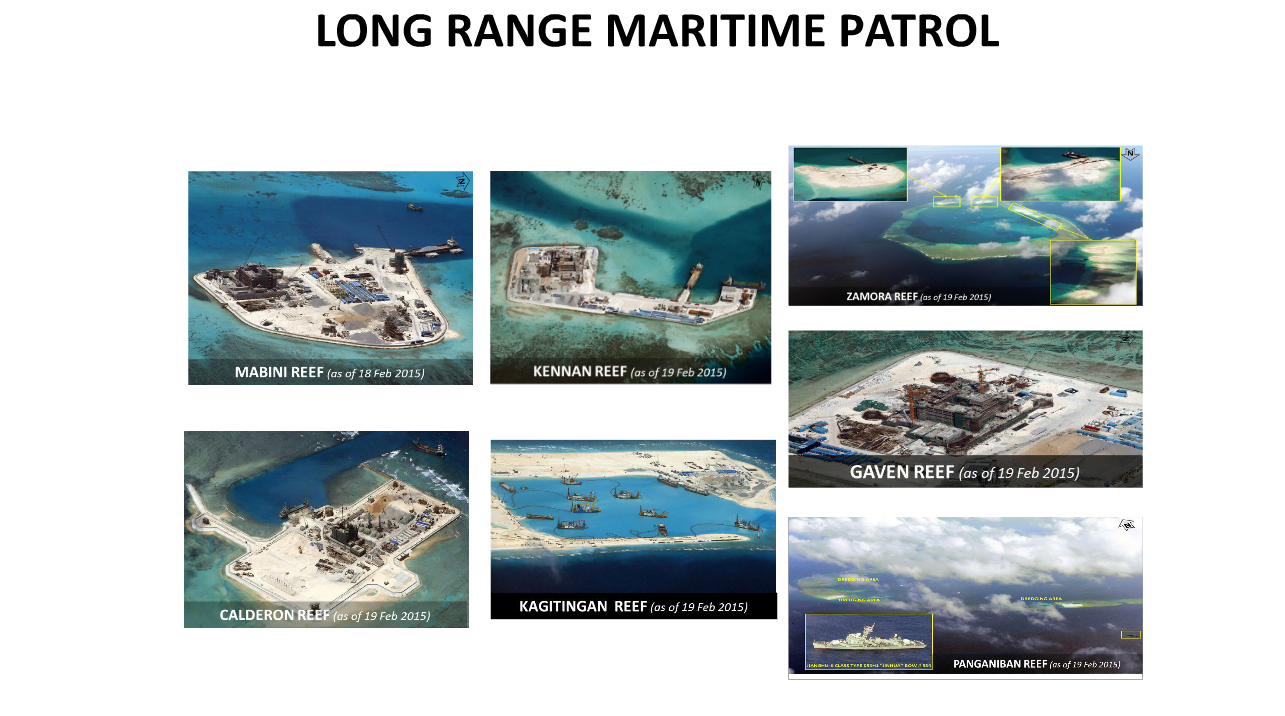US anxious over China’s ‘great wall of sand’
WASHINGTON — The United States is weighing sending warships and surveillance aircraft near artificial islands built by China to challenge Beijing’s territorial claims in the South China Sea, officials said Wednesday.
But the US officials acknowledge Beijing’s massive land reclamation effort, dubbed by an American naval commander as China’s “great wall of sand,” may be difficult to stop.
The Pentagon is weighing a range of options, including sailing destroyers or other naval ships within 12 nautical miles of the man-made islands, as well as flying P-3 and P-8 surveillance planes overhead, two defense officials told AFP.
The maritime and air patrols would be designed “to demonstrate support for freedom of navigation” and “to reassure our allies,” said one official, who spoke on condition of anonymity.
“We have never recognized these artificial islands as legitimate claims,” the official said.
US officials increasingly believe Washington needs to send a clear signal about China’s dredging activities around the Spratly Islands and other disputed territories, though they want to calibrate any military operation to avoid triggering a crisis.
Officials admitted China has been building at a rapid pace in recent years and that concerns expressed by the United States and regional governments so far have had little effect.
Pentagon officials last week revealed that China is building artificial islands on top of coral reefs at an unprecedented pace. The rapid construction comes to 2,000 acres (800 hectares), with 75 percent of the total just in the last five months.
At four reclamation sites, China has moved from dredging to infrastructure work that could include harbors for larger ships, communications systems and at least one airfield, a Defense Department report said.
“We are actively assessing the military implication of land reclamation and are committed to taking effective and appropriate action,” David Shear, assistant secretary of defense for Asian and Pacific security affairs, told senators Wednesday.
Building on submerged features did not qualify as a recognized territorial claim, he said.
“It is difficult to see how Chinese behavior in particular comports with international law,” he said.
No change in behavior
Washington is concerned China’s increasingly assertive stance could undermine the sovereignty of neighboring nations and undercut America’s naval power in the Pacific.
To try to check Beijing’s expansion in the South China Sea, the United States has backed diplomatic efforts by regional governments to defuse rival territorial claims and bolstered its military profile.
Washington has started deploying Littoral Combat Ships to Singapore, increased port calls in and around the South China Sea, stepped up reconnaissance flights and tried to bolster coast guard forces in the area.
But lawmakers told Pentagon and State Department officials that the United States needed a tougher policy and that so far China has shrugged off Washington’s objections.
“I don’t see their behavior changing, It seems to me that in a very short amount of time, they are going to have de facto control of the South China Sea,” said Senator Bob Corker, chairman of the Senate Foreign Relations Committee.
Officials told senators that China has had to back off at times when faced with concerted diplomatic pressure and resistance from neighboring countries.
China was forced to withdraw a giant oil rig last year in disputed waters off of Vietnam’s coast, said David Russel, assistant secretary of state for East Asian and Pacific Affairs.
Beijing pulled back the rig after the move prompted repeated clashes at sea between Chinese vessels deployed to guard it and Vietnamese boats.
China on Wednesday denounced any expansion in the US military’s presence in the area.
“Freedom of navigation does not mean that the military vessels or aircraft of a foreign country can willfully enter the territorial waters or airspace of another country,” Chinese foreign ministry spokeswoman Hua Chunying said in Beijing.
China claims nearly all of the South China Sea, even waters approaching the coasts of its Asian neighbors.
The disputed waters are home to vital global shipping lanes and are believed to be rich in oil and gas.
Washington has flexed its military muscle previously to try to counter what it considers Beijing’s aggressive moves.
Last November, two long-range B-52 bombers flew over China’s newly-declared Air Defense Identification Zone (ADIZ) in the East China Sea.
China’s dredging work could ultimately hamper America’s ability to project its military power and heighten the risk of a dangerous miscalculation, said Alexander Sullivan of the Center for a New American Security, a Washington think tank.
“Politically, Chinese control over the South China Sea would strike a major blow to perceptions of US power in Asia, the world’s most consequential region,” Sullivan said.
RELATED STORIES
PH outgunned in China’s island-building frenzy
China angry over US military ‘plans’ in disputed waters
RELATED VIDEOS:















